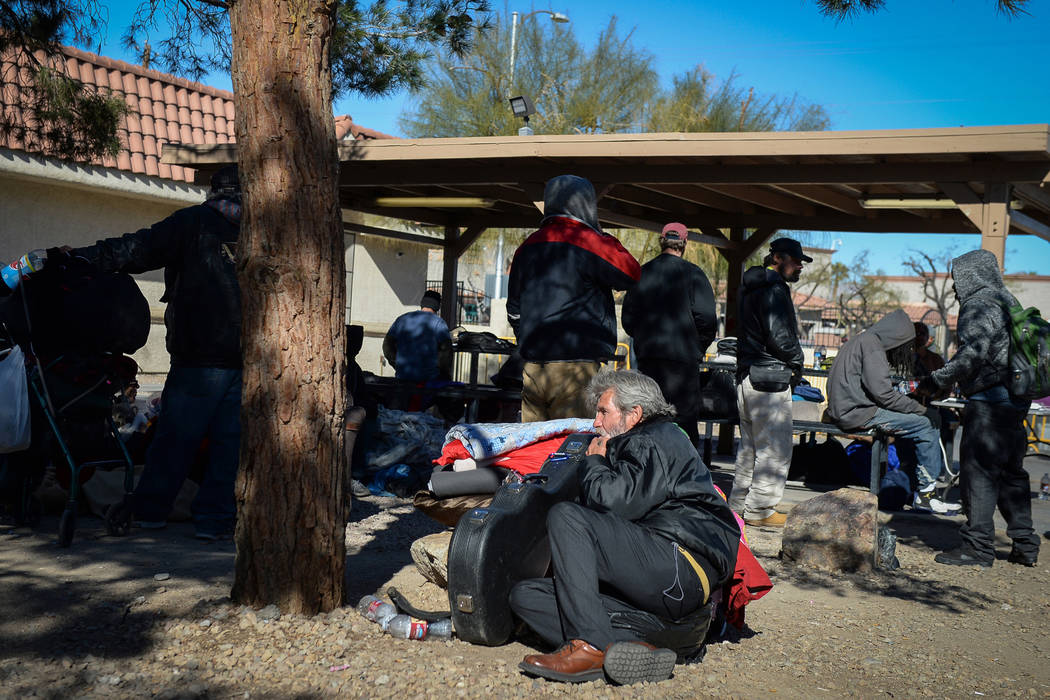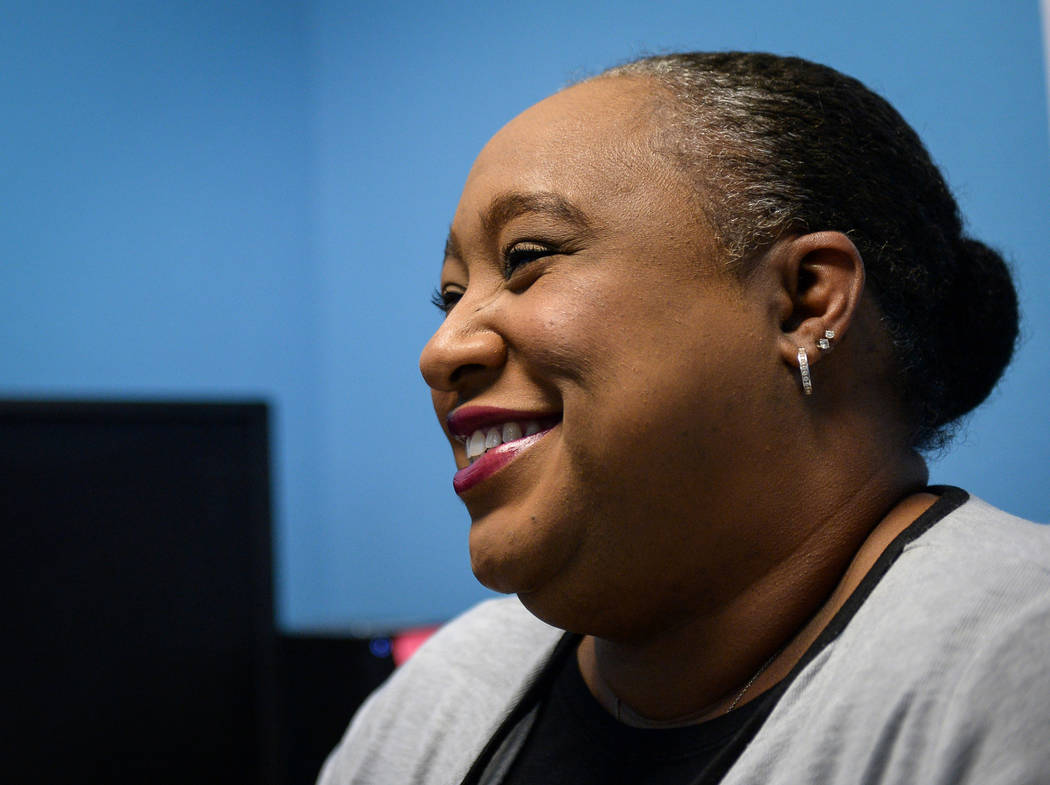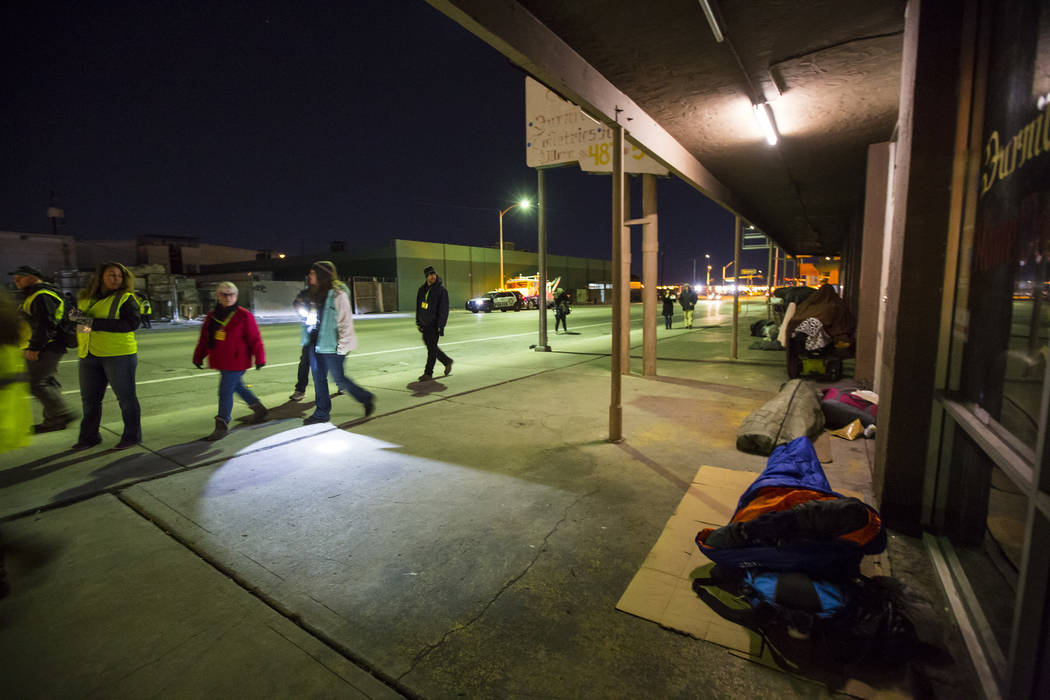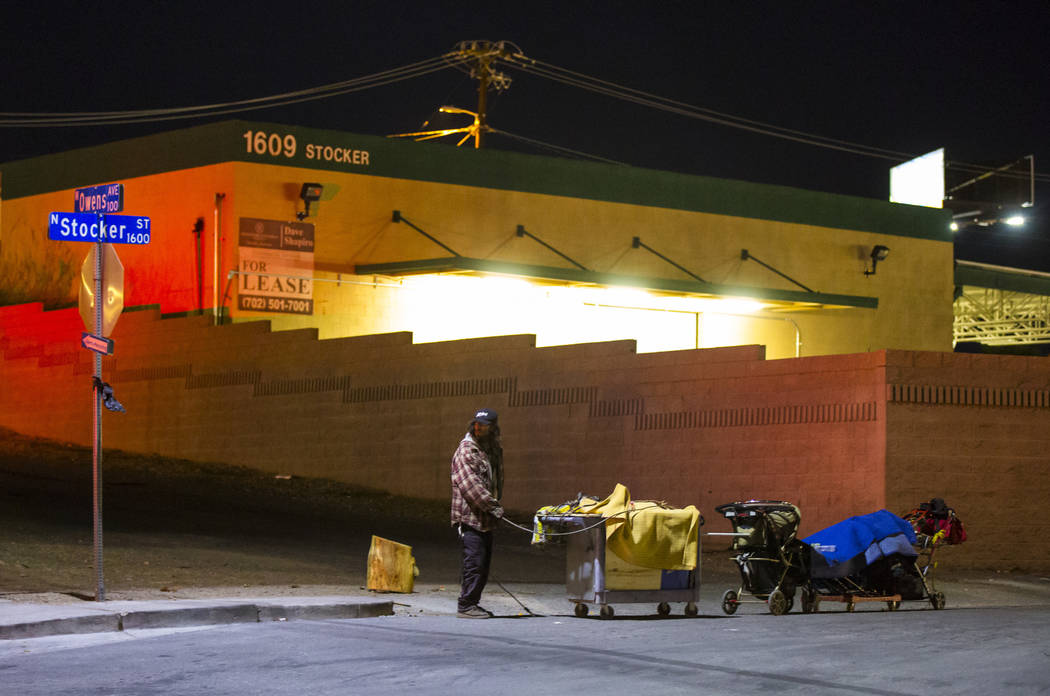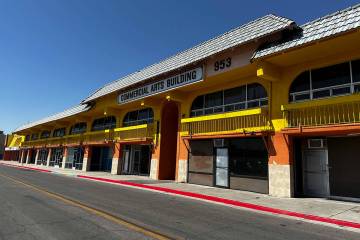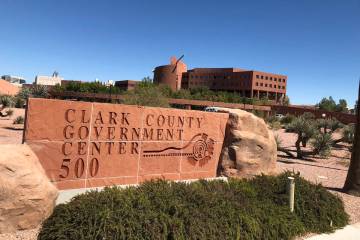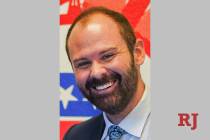Coordination considered key in Clark County homeless housing program
Organizations that minister to the Las Vegas Valley’s homeless are applauding the Clark County Commission’s vote last month to direct up to $12 million a year in marijuana fees to build new housing, but some caution that the effort needs to be well-coordinated with other local initiatives.
“The city and the county are not going to agree on everything, but chronic homelessness should be a rope that we can all grab on together,” said Deacon Tom Roberts, CEO of Catholic Charities of Southern Nevada.
The commissioners voted Jan. 22 to direct the marijuana money to homelessness programs, taking a “housing-first” approach to the issue. The commission also plans to expand case management resources.
The county currently spends more than $14 million in grant money each year to maintain existing homeless programs. Additional funds from the county’s tax revenues are allocated toward social services.
The new money will represent an 86 percent increase to expand homeless-specific programs.
No one disagrees that more housing is a necessity. More than 1,600 homeless people in Southern Nevada are on a waiting list for either temporary or permanent shelter, including 199 families and 113 individuals under the age of 25.
And numbers released recently indicate that the overall homeless population in the county is roughly 6,000.
Other needs highlighted
But some nonprofits that have been serving the homeless community for years argue that there is a need to first assess mental health and substance abuse.
Roberts, for example, argues that the county should consider replicating the city of Las Vegas’ homeless courtyard in other parts of the valley where there are clusters of homeless, such as the southern Strip, East Boulder Highway and North Las Vegas.
The city’s round-the-clock courtyard offers a range of services, including bathrooms, showers, medical and mental health services, housing, employment help and a safe place to sleep in a secure, open-air space.
“We need more resources. We need more mental health and addiction resources,” Roberts said.
Las Vegas Rescue Mission CEO Heather Engle echoed that sentiment, saying in a statement that there isn’t one specific need to address homelessness. It’s a systemic issue ranging from work and legal considerations, substance abuse, mental health and children aging out of foster care.
In other words, housing itself isn’t enough.
“Integrated housing with long-term case management is crucial,” Engle said, while emphasizing mental health or substance abuse treatment and care. “It’s about helping them all truly live and not just survive.”
The county plan calls for expanded case-management services, but Commissioner Marilyn Kirkpatrick, who introduced the proposal to use the marijuana fees to address homelessness, said details would not be revealed until the commissioners draft a more detailed plan, expected in the next few weeks.
But she gave a few hints about the broad outlines of the plan to use additional housing to begin removing specific groups from the streets, thereby helping the homeless population as a whole.
The resolution directs county staffers to focus first on children, particularly those who transition out of foster care and end up on the streets. She said the county has also been working with veterans groups.
“I’ve already spoken with (Las Vegas Mayor Carolyn Goodman). We’re working together as much as possible,” she said.
Goodman said in her State of the City address that homelessness should be a regional effort, with help from the private sector.
‘Attainable housing’
“We all need to focus on different components, and we need to have some attainable housing for all kinds of folks,” Kirkpatrick said. “We don’t want homelessness to grow as rental prices grow.”
Michelle Fuller-Hallauer, the social service manager and local coordinator for HUD’s Continuum of Care Program to end homelessness, works with the county and Clark County municipalities to coordinate individual efforts.
“There is plenty of work to go around,” she said. “Each of the jurisdictions kind of work in the space that’s best there so we can work together to build a system that’s healthy and can meet the needs.”
Arnold Stalk, the founder of Veterans Village, which works with the Department of Veterans Affairs and other nonprofits to provide housing for military veterans, said he agrees with the county’s prioritization.
“You can’t solve a homeless problem without building housing,” he said.
But collaboration will be key, Stalk said.
“When you have five municipalities in a small valley and none of them work together and they’re all busy having their own press conferences about things, who can outdo the next one, that’s a real challenge,” he said.
But Jocelyn Bluitt-Fisher, the city of Las Vegas’ community services administrator, said local governments have gotten better at working together.
She pointed to the new Shannon West Homeless Youth Center, which opened in 2017 and was funded with roughly $10 million from the county and the cities of Las Vegas, North Las Vegas and Henderson.
“We know that the courtyard is not going to be the answer to homelessness,” Bluitt-Fisher said. “We are still looking at other options and programs and are very much a part of what is being done regionally.”
Clark County Commissioner James Gibson, who voted for allocating the marijuana fees, said the new initiative will complement the city’s efforts by offering stability to those who go through other programs, such as vocational training, transitional housing and drug or mental health treatment.
“It’s one thing to get them in the system, but the other thing to keep them there,” he said. “The piece that really needed our efforts would be the living quarters.”
Land parcels identified
He said the county has identified federal land that could be made available for housing projects and is looking to acquire private property as well.
“What the city is doing is important,” he said. “But without the housing, the outcome isn’t necessarily that you took somebody off the streets.”
Ryan McDonald, homeless service coordinator for the local Salvation Army, said the valley’s nonprofits also “all realize that together we achieve more. Although we are separate entities, we’re all in this together.”
The Salvation Army shelter sleeps more than 100 a night, while Catholic Charities sleeps about 500 men, The Rescue Mission has 172 beds and the courtyard sleeps a little over 220. The need for housing is great, he said, and as nonprofits communicate, they refer clients to one another.
“The biggest need is affordable housing,” McDonald said. “It doesn’t matter what we do here if we can’t get them to the next point. If that next point doesn’t exist, than we’re stuck here, walking in a circle.”
Contact Briana Erickson at berickson@reviewjournal.com or 702-387-5244. Follow @brianarerick on Twitter.



